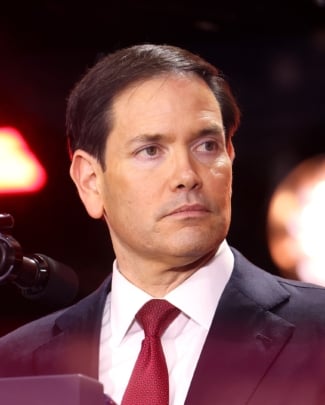NEW ANSWERS FOR HOMELESSNESS FROM TRUMP ADMINISTRATION
INAUGURAL MEETING OF THE NEW INTERNATIONAL RELIGIOUS FREEDOM ALLIANCE
WHAT TO EXPECT FROM THE STATE OF THE UNION
FOX SPORTS WOULDN’T SHARE THIS AD, BUT YOU CAN
PRES TRUMP ACTS ON CORONAVIRUS
NEW ANSWERS FOR HOMELESSNESS FROM TRUMP ADMINISTRATION
In December, President Donald Trump’s administration named Robert Marbut, Ph.D. as the executive director of the U.S. Interagency Council on Homelessness (USICH) which works with 19 different federal agencies on addressing homelessness.
About a month into his new job, Marbut spoke on a panel for the Texas Public Policy Foundation (TPPF), a conservative thinktank in Austin.
The panel was part of TPPF’s Policy Orientation program.
Marbut is familiar with efforts to end homelessness in Texas, he was the founding president and CEO for the San Antonio homeless shelter Haven for Hope as well as a former city council member and Mayor Pro Tem in San Antonio. He also served as a White House Fellow to President George W. Bush.
“President Trump has gone days talking about [homelessness] every single day,” Marbut said Thursday, emphasizing that homelessness is a high-priority issue for the president. “He sees the humanitarian crisis that’s going on.”
On the panel Thursday, Marbut talked at a length about what he sees as the value of requiring that homeless individuals accessing services receive recovery and treatment as well.
“Once you’re in the program, whatever the program looks like,” Marbut said. “You have to have treatment recovery that’s customized for you.
“And if you’re not doing it, it has to either be incentivized or required,” he continued. “Whatever it is, it has to be customized to your issue that has catalyzed your event — whatever you lost your house to in the first place.”
Currently, the U.S. Department of Housing and Urban Development (HUD) does not require treatment or recovery for people experiencing homelessness to access services or housing.
So KXAN asked Marbut, is that something he sees the federal government working towards in the future: requiring more treatment to get services?
“Literally we’re just engaging this now,” Marbut said. “We have to talk to our congressional partners on this and walk through the data, walk through why it’s so important to have recovery services and treatment services and couple them together, and so we are starting that activity now.”
The kinds of changes Marbut is interested in making would require authorization from Congress, he said.
A different approach to “housing first”
The policy the federal government has encouraged in addressing homelessness for the past few years is known as “housing first” which aims to get people experiencing homelessness housed quickly without preconditions and barriers to entry, like sobriety, treatment, or service participation.
Marbut’s views reflect a departure from policies on homelessness that are centered around “housing first.”
KXAN asked Marbut if he believes the U.S. should be moving away from an approach that is squarely focused on housing first.
He replied, “what the President and the administration wants to do is what we call trauma-informed treatment and trauma-informed recovery and you tie it with affordable housing and that gives you housing stability.”
“I used to think housing first was just a waste of money, I used to think that,” Marbut said, noting that he now thinks there are cases where housing first can be useful.
But he clarified, “housing first is a tool in the toolbox, it’s not a one-size-fits-all use for everybody tool, and that’s what it’s become.”
Marbut’s approach differs from that of his predecessor, Matthew Doherty, who was appointed in 2015 during President Obama’s administration and was reported to have been pushed out of the role in November 2019.
Doherty was quoted in 2019 encouraging people to, “resist bogus arguments that a focus on Housing First imposes a one-size-fits-all solution on people or programs.”
“We can speak the real truth that Housing First approaches are the opposite of one-size-fits-all and help ensure that we don’t leave anyone behind,” Doherty said.
At the same event where Doherty spoke in 2019, HUD Secretary Ben Carson said, “I like to follow the evidence and the evidence then and now supports much of the work that has been done here and supports housing first.”
“The fact of the matter is, it costs a lot less to house someone than to leave someone on the streets,” Carson said that time.
The federal precedent of housing first policy is now embedded in the systems homeless service providers use to do their work.
Greg McCormack, the executive director of Front Steps who operates Austin’s Resource Center for the Homeless explained that “in order to reapply for HUD permanent supportive housing funding, we and all of the entities in Austin are required to declare and verify that we follow the housing first model and that we don’t have barriers to entry like requiring sobriety.”
Changing the federal policy conversation
At the panel Thursday, Marbut presented attendees with data from HUD that he said had never been seen before. The data tracks the growing number of people experiencing homelessness in the U.S. alongside what services these individuals were getting.
Marbut believes the data shows simply increasing funding and permanent supportive housing beds doesn’t result in more people exiting homelessness.
In a statement from December 2019, Marbut summarized his concern with previous approaches by the federal government: “We need to be honest with ourselves, much of what we have been doing is not working. If it were working, the number of individuals and families experiencing homelessness would be dropping.”
In the past six weeks, Marbut said the president has been moving the conversation forward in shifting from the way the housing first approach had been carried out in the past.
“That’s been what’s been so great about this president and this administration is we’re gonna start changing that,” Marbut said, acknowledging not everyone agrees with him. “And we know we’re over the target because we’re getting shot at.”
(Excerpt from kxan. Article by Alyssa Goard.)
Partner with Us
Intercessors for America is the trusted resource for millions of people across the United States committed to praying for our nation. If you have benefited from IFA's resources and community, please consider joining us as a monthly support partner. As a 501(c)3 organization, it's through your support that all this possible.


We use cookies to ensure that we give you the best experience on our website. If you continue to use this site we will assume that you are happy with it. Privacy Policy




Comments
This truly is a modern-day phenomenon. We are witnesses to this strangely growing demographic. I believe this is a sign of growing hopelessness rooted in fatherlessness. So Father I believe you have the answer and the cure. I pray for a return of the children to the fathers and the fathers to the children. Release a new spirit on america to overcome and meet the need of this new growing manifestation of homelessness rooted in hopelessness. Break the feeding and fostering cycle of this by well meaning maintenance programs that don’t cure. Restore minds, restore hope, restore faith, restore a spirit of sonship and bring all your children into your household. Show them their value and purpose and plans. Raise up a fearless, wall less church that will address and speak to this. A church that will touch and heal. I pray for wisdom by government administrations that understand the need and value of such an army without walls and who will without hinderance foster this win. Father may you release for this demographic power! Power to save, heal, and deliver these prodigals. Amen
Heavenly Father, give great insight and wisdom in how to bring to an end this blight of homelessness on our nation. Give new ideas to those who are appointed to study and provide solutions to this problem. May Jesus Christ be lifted up because He is the Answer!